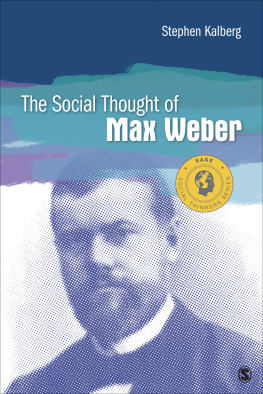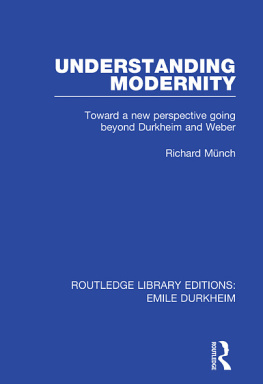MARX AND WEBER ON ORIENTAL SOCIETIES
Classical and Contemporary
Social Theory
Series Editor: Stjepan G. Mestrovic, Texas A&M University, USA
Classical and Contemporary Social Theory publishes rigorous scholarly work that re-discovers the relevance of social theory for contemporary times, demonstrating the enduring importance of theory for modern social issues. The series covers social theory in a broad sense, inviting contributions on both classical and modern theory, thus encompassing sociology, without being confined to a single discipline. As such, work from across the social sciences is welcome, provided that volumes address the social context of particular issues, subjects, or figures and offer new understandings of social reality and the contribution of a theorist or school to our understanding of it. The series considers significant new appraisals of established thinkers or schools, comparative works or contributions that discuss a particular social issue or phenomenon in relation to the work of specific theorists or theoretical approaches. Contributions are welcome that assess broad strands of thought within certain schools or across the work of a number of thinkers, but always with an eye toward contributing to contemporary understandings of social issues and contexts.
Also in the series
The Puritan Culture of Americas Military
U.S. Army War Crimes in Iraq and Afghanistan
Ronald Lorenzo
ISBN 978-1-4724-1982-8
A Genealogy of Social Violence
Founding Murder, Rawlsian Fairness, and the Future of the Family
Clint Jones
ISBN 978-1-4724-1722-0
Liquid Sociology
Metaphor in Zygmunt Baumans Analysis of Modernity
Edited by Mark Davis
ISBN 978-1-4094-3887-8
Marx and Weber
on Oriental Societies
In the Shadow of Western Modernity
LUTFI SUNAR
Istanbul University, Turkey
ASHGATE
Lutfi Sunar 2014
All rights reserved. No part of this publication may be reproduced, stored in a retrieval system or transmitted in any form or by any means, electronic, mechanical, photocopying, recording or otherwise without the prior permission of the publisher.
Lutfi Sunar has asserted his right under the Copyright, Designs and Patents Act, 1988, to be identified as the author of this work.
Published by
Ashgate Publishing Limited
Wey Court East
Union Road
Farnham
Surrey, GU9 7PT
England
Ashgate Publishing Company
110 Cherry Street
Suite 3-1
Burlington, VT 05401-3818
USA
www.ashgate.com
British Library Cataloguing in Publication Data
A catalogue record for this book is available from the British Library
The Library of Congress has cataloged the printed edition as follows:
Sunar, Lutfi
Marx and Weber on oriental societies : in the shadow of western modernity / by Lutfi Sunar.
pages cm
Includes bibliographical references and index.
ISBN 978-1-4724-1716-9 (hardback : alk. paper) -- ISBN 978-1-4724-1717-6 (ebook) -- ISBN 978-1-4724-1718-3 (epub) 1. Marx, Karl, 1818-1883. 2. Weber, Max, 1864-1920. 3. Civilization, Oriental. 4. Civilization, Modern. I. Title.
B3305.M74S768 2014
301.095--dc23
2013034189
ISBN: 978-1-4724-1716-9 (hbk)
ISBN: 978-1-4724-1717-6 (ebk-PDF)
ISBN: 978-1-4724-1718-3 (ebk-ePUB)
Cover image: Jean-Lon Grme, Oedipus, or Napoleon Bonaparte before Sphinx (186768)
To my beloved wife, Dilad.
Contents
List of Tables
Series Editors
Preface
In this book, Lutfi Sunar offers a new perspective on the modern attitude toward the Orient found in the works of Karl Marx and Max Weber. In painstaking detail, Sunar shows that both Marx and Weber were ethnocentric and arrogant in their attitudes toward societies, religions, and cultures that used to be called Oriental, including but not limited to Russia, Islam, India, Buddhism, and China. Sunars thesis is far from obvious. In academia, Marx is hailed as the champion of the working classes and as the philosopher of the concept of alienation. But, to pick one of many counterexamples to this general perception, Sunar shows that in his writings on British Imperialism in India, Marx sympathized with the Britishnot the oppressed Hindus. Marx perceived the British as the harbingers of civilization that would deservedly wipe out alleged Hindu backwardness, superstition, and tradition. Similarly, Weber is best known today through the prism of George Ritzers McDonaldization of Society, namely, as the discoverer of modern, Western, rationality, efficiency, predictability, and control. But the dark side of this interpretation of Weber is that he regarded all cultures that were based on non-Protestant roots as irrational, inefficient, unpredictable, and chaotic.
To the small extent that these ethnocentric attitudes in the works of Marx and Weber have been noticed, they have been dismissed in various ways. Thus, Sunar shows that Marx and Weber influenced the contemporary social theorist, Anthony Giddens, to depict modernity as a monster. More precisely, Giddens uses the metaphor of the juggernaut to depict Western modernity, but he does not challenge the Marxist assumption that his juggernaut must, inevitably, crush all non-Western cultures in its path. On the other extreme, in his book, Orientalism, Edward Said lumps all the founders of sociology (not just Marx and Weber) with Western artists, philosophers, and writers as depicting the Orient in deprecatory, negative ways. Saids brush is too broad. For example, the sociologist mile Durkheim was a champion of cultural relativism and he argued against the attitude that is known today as ethnocentrism. Durkheim believed that all religions and cultural habits were true in their own way so long as they helped any given society function. Similarly, the philosopher Arthur Schopenhauer stands out as an exception in the pantheon of Eurocentric philosophers in that he explicitly appreciated the insights and values of Chinese and Hindu philosophy. Unlike Giddens and Said, Sunar is very precise and meticulous in his depiction of the ethnocentrism found in the works of Marx and Weber: he cites works by them that are not widely known; he compares and contrasts how their views have been received in a vast, secondary literature; and he finds similarities as well as differences in their attitudes toward the Orient.
The issue that emerges from Sunars book is this: How have these two particular strands of what is broadly known as Western ethnocentrism and Eurocentrismnamely, Marxism and Weberianisminfluenced the paths of various civilizations? Sunar shows a historians attention to detail in tracing the various paths these two doctrines took geographically as well as intellectually. It is ironic that Marxism migrated into the very, backward, cultures that Marx did not believe were ripe for a modern, Communist, revolution, especially Russia and China. The other irony is that a form of Western modernity was imported into tradition-directed Russian and Chinese cultures. It is important to keep in mind that Communism was and still is a form of modernity. And various Communist regimes used this Marxist version of modernity to fulfill Marxs vision of British Imperialism in India, namely, to attempt to wipe out backwardness, superstition, and tradition. On the other hand, it was Talcott Parsons who translated Max Webers The Protestant Ethic and the Spirit of Capitalism and in that way brought Weber to America. The cultural affinities for this connection are numerous, from the fact that Parsons was the son of a Congregationalist minister to the fact that the Puritan traditions of America are still strong. As Ritzer correctly points out, the twentieth century in America was fundamentally Weberian in its grand vision of efficiency, McDonaldization, and the exponential growth of bureaucracy. But it was also a century of demonizing the other, from fighting the Huns in the First World War through fighting the Evil Empire during the Cold War to the current War on Terror.
Next page





